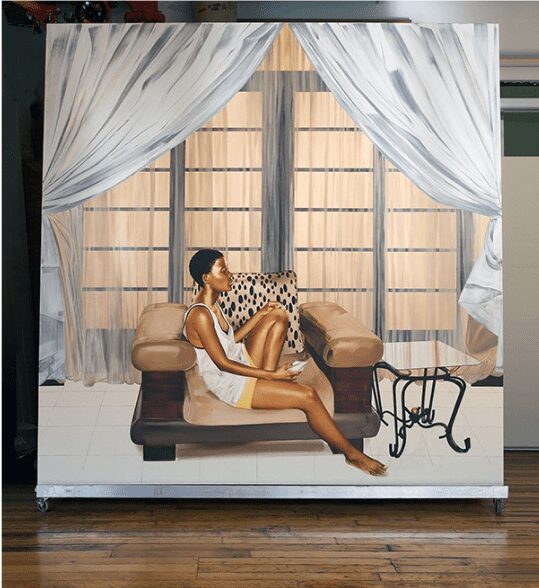Fowler Museum, Los Angeles, United States
11 Feb 2018 - 01 Jul 2018

Meleko Mokgosi, Democratic Intuition, Bread, Butter, and Power (studio view), 2017. Courtesy of the artist and Honor Fraser Gallery, Los Angeles.
Opening February 11 at the Fowler Museum at UCLA, Meleko Mokgosi: Bread, Butter, and Power is a newly commissioned installation consisting of twenty large-scale paintings hung frieze-style around the perimeter of the Lucas Gallery.
Masterfully rendered scenes of daily life in southern Africa address themes of feminism, the gendered division of labor, and the place of women in the nation-state. Bread, Butter, and Power comprises the most recent chapter in Mokgosi’s series Democratic Intuition (2013–present), which explores the ways that democratic concepts influence our lives, loves, and relationships. Bread, Butter, and Power is Mokgosi’s first solo museum exhibition in Los Angeles and a home – coming for the Botswana-born, New York-based artist, who earned his MFA from the Interdisciplinary Studio program at UCLA in 2011.
Several paintings in the installation picture intimate scenes of men and women in their homes—interior spaces that reflect their lived experience. In one, for example, a young woman sits casually on a comfortable chair in an airy, well-appointed room. Her leisurely pose raises questions about the labor expected of women according to their socioeconomic positions. Other canvases venture outdoors to portray groups of school children and market stands. These explore ideas about the varied standing of women across the social fabric of southern Africa, the sacrifices made by women, and the failure of national governments to value their hard work. Mokgosi is, by his own account, a history painter. He employs a European style of narrative story- telling to reclaim histories of southern Africa and distinguish them from those imposed by colonial powers. This approach posits new stories while simultaneously upending accepted narratives. Before he begins each new chapter of a painting series, Mokgosi spends time gathering images and creating storyboards that reflect the intertwined roles of politics and history. Again subverting the conventions of traditional Western painting, he leaves his canvases unprimed. The raw canvas means that every brushstroke has permanency; fixing “mistakes” is not an option. The intentionality and precision of Mokgosi’s painting underscores the urgency of his messages. Mokgosi lends his critical voice to the experiences of young African artists of his generation, born since the euphoria of the 1960s independence movements. In adopting a historian’s approach— drawing on extensive research and theoretical grounding—he provides new perspectives on the transition from the colonial era through to Botswana’s independence, and interrogates the current moment as it relates to the rippling ramifications of the past.
Mokgosi has said: “I think historicalspecifics are crucial because I am grappling with the epistemological effects of colonialism in southern Africa. So it is urgent, I believe, to parse out how history has been legitimized, what dominant histories have been left out, and more importantly, how to trace untracked histories and bring them to the fore, because these are all histories that matter.”
About the Artist
Meleko Mokgosi (b. 1981; Francistown, Botswana) lives in New York, where he teaches at the Gallatin School at New York University. He completed the Affiliate Painting Program at the Slade School of Fine Art, University of London (2006); received his BFA from Williams College (2007); attended the Independent Study Program at the Whitney Museum of American Art, New York (2007–2008); and received his MFA from UCLA (2011).
Fowler Museum
308 Charles E Young Dr N
Los Angeles, CA 90024